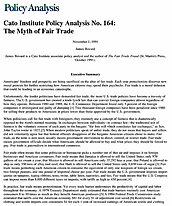Americans’ freedom and prosperity are being sacrificed on the altar of fair trade. Each year protectionists discover new moral pretexts for further restricting how American citizens may spend their paychecks. Fair trade is a moral delusion that could be leading to an economic catastrophe.
Unfortunately, the louder politicians have demanded fair trade, the more U.S. trade policies have become a travesty of fairness. The U.S. government has created a trade lynch law that can convict foreign companies almost regardless of how they operate. Between 1980 and 1989, the U.S. Commerce Department found only 5 percent of the foreign companies it investigated not guilty of dumping.[1] Two thousand foreign companies have been penalized since 1980 for selling their products to Americans at prices lower than those approved by the U.S. government.
When politicians call for fair trade with foreigners, they routinely use a concept of fairness that is diametrically opposed to the word’s normal meaning. In exchanges between individuals–in contract law–the traditional test of fairness is the voluntary consent of each party to the bargain: “the free will which constitutes fair exchanges,” as Sen. John Taylor wrote in 1822.[2] When modern politicians speak of unfair trade, they do not mean that buyers and sellers did not voluntarily agree but that federal officials disapprove of the bargains American citizens chose to make. Fair trade, as the term is now used, usually means government intervention to direct, control, or restrict trade. Fair trade means government officials decide what Americans should be allowed to buy and what prices they should be forced to pay. Fair trade is paternalism in international commerce.
Fair trade often means that some politician or bureaucrat picks a number out of thin air and imposes it on foreign businesses and American consumers. Fair trade means that Jamaica is allowed to sell the United States only 970 gallons of ice cream a year, that Mexico is allowed to sell Americans only 35,292 bras a year, that Poland is allowed to ship us only 350 tons of alloy tool steel, that Haiti is allowed to sell the United States only 8,030 tons of sugar.[3] Fair trade means permitting each American citizen to consume the equivalent of only one teaspoon of foreign ice cream, two foreign peanuts, and one pound of imported cheese per year. Fair trade means the U.S. government imposes import quotas on tampons, typing ribbons, tents, twine, table linen, tapestries, and ties. Fair trade means that the U.S. Congress can impose more than 8,000 different taxes on imports, with tariffs as high as 458 percent.[4]
In practice, fair trade means protectionism. Yet every trade barrier undermines the productivity of capital and labor throughout the economy. A 1979 Treasury Department study estimated that trade barriers routinely cost American consumers 8 to 10 times as much as they benefit American producers.[5] A 1984 Federal Trade Commission study estimated that tariffs cost the American economy $81 for every $1 of adjustment cost saved.[6] Restrictions on clothing and textile imports cost consumers $1 for each 1 cent of increased earnings of American textile and clothing workers.[7] According to the Institute for International Economics, trade barriers are costing American consumers $80 billion a year–or more than $1,200 per family.[8]
We will examine the U.S. anti-dumping law, U.S. counter-vailing duty law, U.S. retaliations against alleged foreign unfair trade barriers, and the moral essence of fair trade.

This work is licensed under a Creative Commons Attribution-NonCommercial-ShareAlike 4.0 International License.

